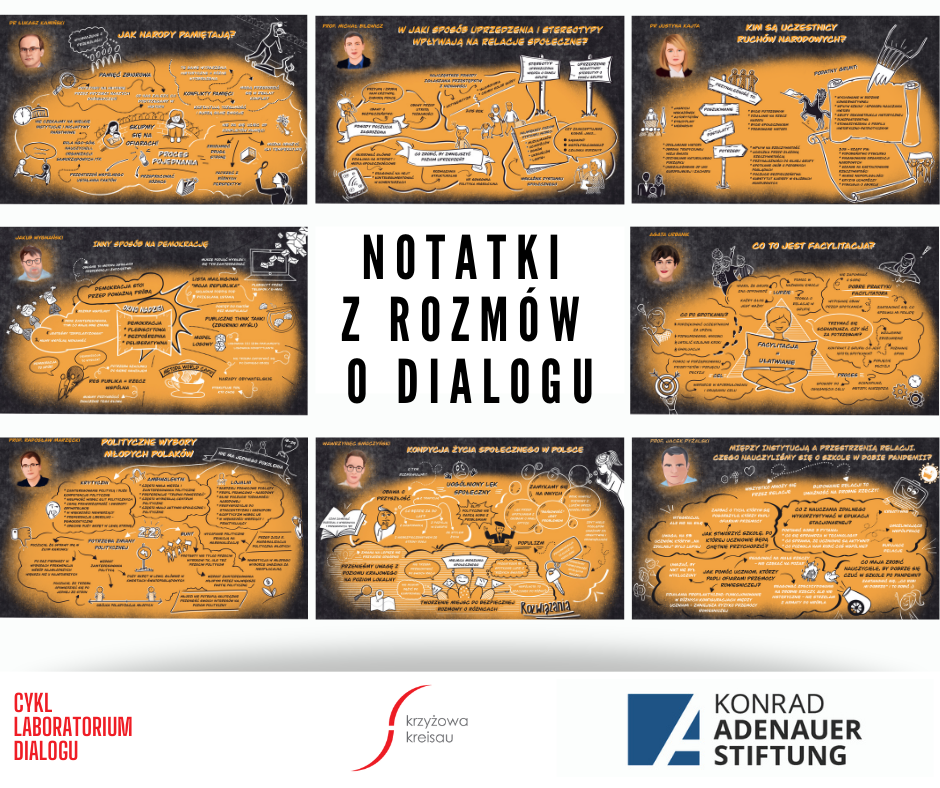 Conversations about dialogue. With notes - edited by Tomasz Skonieczny, published by the Krzyżowa Foundation for Mutual Understanding in Europe, 2021
Conversations about dialogue. With notes - edited by Tomasz Skonieczny, published by the Krzyżowa Foundation for Mutual Understanding in Europe, 2021
FROM THE INTRODUCTION
"The publication which is now displayed on your screens is the result of a series of meetings and conversations to which in 2021 we invited people who are professionally involved - from a practical or theoretical point of view - in issues related to what our public life looks like and, consequently, our attitude towards each other. Or, looking at things from a broader perspective, what elements determine what our culture of dialogue looks like.
Read more: PUBLICATION || Conversations about dialogue. With notes - edited by Tomasz Skonieczny
 At the beginning of 2021, in the face of the ongoing pandemic, the activities of the Third Age Voluntary Service in Krzyzowa were questionable. As it turned out that the applicable safety restrictions and considerations did not interfere with the implementation of a number of activities. Our Seniors regularly took part in intergenerational garden workshops, during which, together with young people from the Primary School in Grodziszcze, they learned about the issues of ecological food production and shared their experience. Each month, Third Age Volunteers also participated in working meetings to evaluate and plan current tasks. They also helped in the construction of a garden in Krzyzowa.
At the beginning of 2021, in the face of the ongoing pandemic, the activities of the Third Age Voluntary Service in Krzyzowa were questionable. As it turned out that the applicable safety restrictions and considerations did not interfere with the implementation of a number of activities. Our Seniors regularly took part in intergenerational garden workshops, during which, together with young people from the Primary School in Grodziszcze, they learned about the issues of ecological food production and shared their experience. Each month, Third Age Volunteers also participated in working meetings to evaluate and plan current tasks. They also helped in the construction of a garden in Krzyzowa.
Read more: Third Age Volunteers - closing of 2021

A meeting of organisers of the Polish-German-French project „Remembering together - for creating future" took place in Göttingen on 13-16 December. The project is a tri-national exchange between Poland, France and Germany, which will focus on historical education. This initiative is the result of cooperation between the Friedland Museum, the International Federation in Göttingen, the Camp des Milles Foundation and the Krzyżowa Foundation for Mutual Understanding in Europe.
Ten participants from each of the three countries will meet three times in 2022 and will work together on the central theme of the project „Remembering together - for creating future". The individual meetings will focus on: History and its impact on memory at the local level, as well as the migrations and escapes that have taken place in Europe in the last century up to the present day. These themes are reflected in the activities of the memorial sites in Krzyżowa, Friedland and Les Milles. The aim of the project is to analyse history together from many perspectives and to derive actions for the future from this.
Read more: „Jazda - crossborder project on the memory culture and migrations". Organisational meeting - 13-16...
Interview with Dr. Uki Maroshek-Klarman, Executive Director of the Adam Institute for Democracy and Peace in Jerusalem and creator of the "Betzavta-Adam Institute's facilitation method".
Anna Kudarewska: Can you please share a bit about "Betzavta-Adam Institute's facilitation method" and how it's used.
Uki Maroshek-Klarman: The "Betzavta-Adam Institute's facilitation method" deals primarily with education for democracy and peace. It‘s relevant, useful and applicable from kindergarten through high school in the formal and informal educational systems as well as for groups working in civil society, NGOs promoting human rights and democracy, communal leaders that encourage communities to help themselves, improve their quality of life, etc... The method is equally suited to young children up to the elderly. It‘s informed by philosophy, sociology and education. The notion was to enable everyone to take part in discussions about democratic values. How can we help understand folks democracy and have intrinsic motivation to promote it in a way that's accessible to all? Of course, the question arises: what should be taught if we want people to be more democratic? If we want everyone involved, we need to create a method that can facilitate that; not force people that are highly educated to lower their standard of teaching or study, and concurrently share their knowledge and thoughts with those that have fewer tools to understand/share their opinions and ideas. Through the "Betzavta – Adam Institute's facilitation" method, everyone partakes from their vantage point of understanding. The activities and games are "Betzavta" tools. You take part in activities that force you to reflect on what you're doing, understand things through this reflection, grasp the principles of democracy and how you can incorporate them into your private life, social life and politics. The activities are designed to enable you to communicate with your peers in the group from an equal standpoint. Games are played together in separate groups of different ages, interest or motivations. We can really learn about ourselves and our peers in the group. From the outset, it's about teaching, educating for democracy and peace.
Read more: „Democracy is about having equal rights to freedom for every person and group“ - interview with...







